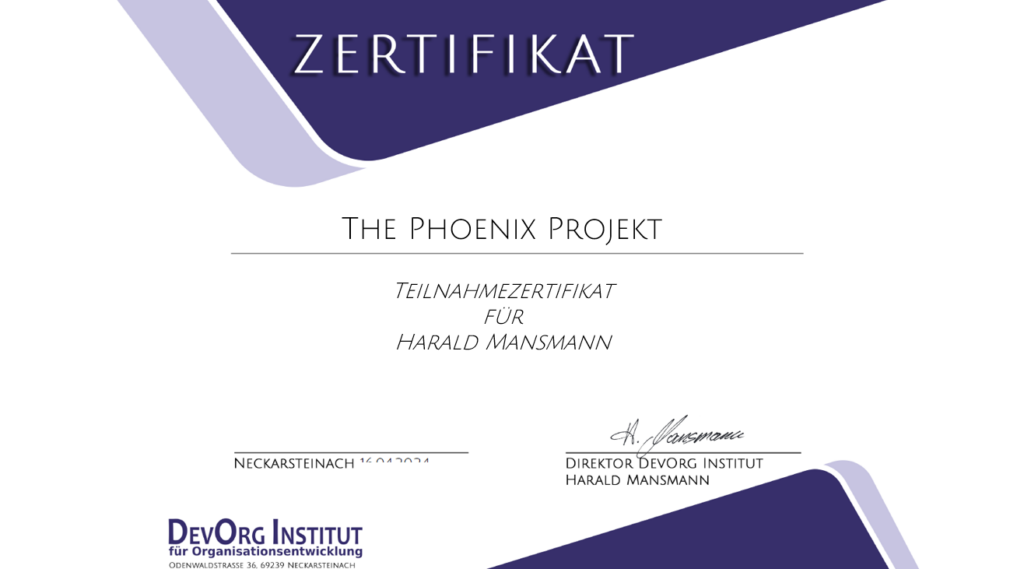The Phoenix Project
A business simulation based on the DevOps book “The Phoenix Project” by Gene Kim. Through the simulation, the team can experience and reflect on their performance as a group in a state-of-the-art business simulation (based on DevOps) and transform what they have learned into their daily work the next day.
One day simulation
The group experiences "DevOps" in the form of a simulation and experiences often criticized behavior patterns first-hand. Through retrospectives after each round, the group learns to change itself in a structured way
2 days Simulation & Utilization
In the 2-day course, the group experiences the first day through the simulation. On the second day, the group reflects on their behavioral patterns as well as their reactions to them. In the 2nd part, the group develops action derivations on how the learned knowledge can be transferred to one's own working day.
3 days of simulation & group dynamics
On the third day of the 3-day course, the group analyzes how the group dynamics have changed on the basis of the actions they have developed themselves. We analyze ourselves as a group from the perspective of a manager (observer role). Managers learn the effectiveness of the behavioral patterns on the conditions of the restrictive framework.
Do you know ...?
Typical behavior patterns (anti-patterns) that can be observed again and again...
Lots of communication
Loss of communication
Self-interest
Lip service
Reflection
Eagerness to work
What does "The Phoenix Project" simulation offer?
The team can experience their performance as a group in a state-of-the-art business simulation (based on DevOps) and recognize unhelpful and helpful behavior patterns.
- Explore and experience the essence of the collaborative nature of DevOps work
- Learn to unlearn bad habits and enforce better habits
- Experience the difficulties of implementation. Learn how hard it is to actually implement structures, clear communication and breaking down silos.
What makes a simulation "The Phoenix Project" special?
- There are more and more cross-border and cross-functional teams that have to work together in global projects.
- Teams are subject to the Tuckman model in every constellation, and if they are not properly guided through the different phases, they will struggle
- Theoretical training is exhausting, usually extremely boring and lacks active participation.
- Agile methods exacerbate the collaboration problems you already have today.
- Agile methods exacerbate the collaboration problems you already have today. Our DevOps simulation “The Phoenix Project” brings the existing disruptions in the team to the surface. During the simulation, the team develops the necessary skills to deliver customer value.
Who should attend "The Phoenix Project" simulation?
- Leaders who want to experience the disastrous effects of inadequate or unfocused leadership.
- Teams (new teams) who want to effectively learn, collaborate and achieve successful business outcomes.
- Participants who have completed DevOps Foundation or DevOps Practitioner training can learn to apply DevOps principles in a real-world scenario.
- Teams who want to improve their current way of working through reflection and experimentation in a safe environment
- Non-IT and management teams who want to understand how visualizing work and communication can improve collaboration within an organization and between teams.
How long does "The Phoenix Project" last?
You have the choice between three different options. As a 1, 2, or even 3-day training course
Simulation
Experience patterns and anti-patterns. Joint development of change. Simulation in 5 iterative rounds. Retrospective after each round.
Simulation + Transformation
All contents of the 1-day simulation. In addition, we reflect on what we learned the day before and develop individual recommendations for action for daily business.
Simulation + Transformation + Group Dynamics
All contents of the 2-day simulation. In addition, we analyze the behavior of the group instead of just looking at the individual.

Certificate
The training concludes with a certificate of participation from the DevOrg Institute for 1, 2 or 3-day training courses
If you are interested in your and your teams’ behavioral patterns and you are looking for changes in collaboration within teams, or need support in developing team collaboration, or simply want to learn more about patterns and anti-patterns, please contact us.
Get IT

GamingWorks Partners
“The DevOrg Institute for Organizational Development is a partner of GamingWorks because we know from our experience that experiential learning is the strongest and most sustainable form of learning. The business simulations of our partner GamingWorks allow the participants to experience complex relationships “up close”.
